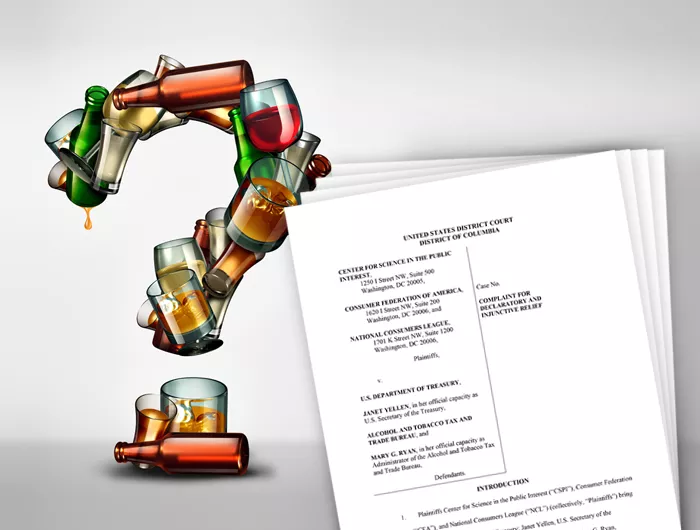Coalition sues to force Treasury Department decision on alcohol labeling

freshidea - stock.adobe.com.
A coalition of consumer groups sued the Treasury Department today to compel a decision on mandatory alcohol content, calorie, ingredient, and allergen labeling on alcoholic beverages.
A coalition of consumer groups sued the Treasury Department today to compel a decision on mandatory alcohol content, calorie, ingredient, and allergen labeling on alcoholic beverages. The coalition, represented by the litigation department of the nonprofit Center for Science in the Public Interest on behalf of itself, the Consumer Federation of America, and the National Consumers League, says the Treasury department has failed to act on a 19-year-old petition urging it to require alcohol labeling with the same basic transparency consumers expect in foods.
Alcohol labeling is a commonsense and popular step that would allow consumers to make informed choices about the alcoholic products they purchase. Drinking alcohol increases the risk of certain diseases and cancers, alcohol use disorders, and severe injuries, and the more alcohol consumed, the greater the risk. However, alcohol labels are not labeled with information like the number of standard drinks per container that would make it easier for consumers to drink in moderation.
In addition to the myriad health and social harms associated with overconsumption of alcohol, alcohol is a significant source of empty calories in the diets of adults who drink. Yet calories are not currently required to be labeled on alcoholic beverages. Moreover, like other foods and beverages, alcoholic beverages contain various ingredients and additives that consumers for health, safety, religious, or other reasons may need or want to avoid. This is particularly true for the millions of Americans with food allergies. Yet, most ingredients are not required to be disclosed on alcohol labels.
Unlike most other food and beverages, which are regulated by the Food and Drug Administration, most alcohol labels are regulated by the Treasury Department, which has forestalled action on mandatory labeling. Instead, Treasury has only put in place a voluntary system that allows companies to put nutrition and allergy information on their products if they so choose.
“The problem is many manufacturers have decided they can sell more by telling consumers less,” said Lisa Mankofsky, CSPI’s litigation director. “So, unless you’re in the market for one of the fairly unusual alcoholic products that falls under FDA regulation (like hard ciders) or happen across a product whose manufacturer volunteers this information, you can expect to remain in the dark about just what it is you are drinking and how it impacts your health.”
In 2003, CSPI, CFA, and NCL and a coalition of 66 other organizations and eight individuals, including four deans of schools of public health, petitioned the Treasury Department seeking mandatory, comprehensive, and uniform labeling on alcoholic beverages. But more than nineteen years later, Treasury is still dragging its feet in responding. This lawsuit will seek to force the Treasury to act on this petition.
“Imagine the chaos in the supermarket if food manufacturers could decide to list ingredients, or not; decide to disclose calories, or not; or include a uniform, easy-to-read label, or not,” said CSPI president Dr. Peter G. Lurie. “Well, that’s the kind of informational chaos we find today in the liquor store. After nearly 20 years of delay, it’s time for the Treasury Department to bring some order to this uneven marketplace.”
“Consumers have waited far too long to get basic nutritional information and ingredients lists on alcoholic beverages,” said NCL Executive Director Sally Greenberg. “We hope that our lawsuit will bring about the kind of robust labeling of these products that consumers have come to expect on every other food and beverage item they consume.”
“Consumers have a right to know what’s in the beverages they drink, whether those beverages are alcoholic or not,” said Thomas Gremillion, Director of Food Policy for CFA. “Standard labeling requirements are commonsense and the federal government’s 19-year delay in responding to this petition is a shameful reflection of Big Alcohol’s influence on policymakers.”
The lawsuit is filed in United States District Court for the District of Columbia.
# # #
CSPI is your food and health watchdog.
CFA is an association of non-profit consumer organizations that was established in 1968 to advance the consumer interest through research, advocacy, and education.
NCL, founded in 1899, is America’s pioneer consumer organization. Our mission is to protect and promote social and economic justice for consumers and workers in the United States and abroad. NCL has long called for better and more expansive food labeling, including on the FDA’s Nutrition Facts panel, restaurant menus, and vending machines. Thus, our interest in alcohol labeling is consistent with NCL’s long-standing commitment to consumer-friendly nutritional and ingredient information on all consumable products.
Contact Info: Contact: Lisa Flores, CSPI, 202-777-8368; Matt Adler, CFA, 202-939-1007; Melody Merin, NCL, 703-298-2614

